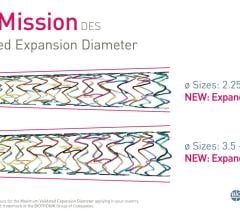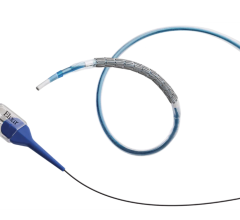May 29, 2007 — Abbott announced positive results last week from ABSORB, the world’s first clinical trial evaluating the safety and performance of a fully bioabsorbable drug eluting stent platform for the treatment of coronary artery disease.
Nine-month results from the first 30 patients in the trial, presented today at the EuroPCR meeting, demonstrated no stent thrombosis and a low (1 patient, 4.0 percent) rate of Major Adverse Cardiac Events (MACE), such as heart attack or repeat interventional medical treatment. The results confirm the six-month findings from ABSORB, which were announced in March 2007, and show no new adverse events between six and nine months.
“These ABSORB nine-month data reaffirm the positive results we saw with Abbott’s bioabsorbable stent system at six months,” said ABSORB investigator Dariusz Dudek, M.D., Jagiellonian University in Krakow, Poland. “As we continue the ABSORB trial, we look forward to evaluating an updated version of the stent system designed to deliver additional support to the arterial wall and with the potential to reduce late lumen loss (vessel renarrowing) even further.”
Abbott’s everolimus eluting bioabsorbable stent is made of polylactic acid, a proven biocompatible material that is commonly used in medical implants such as dissolvable sutures. As with a metallic stent, Abbott’s bioabsorbable stent is designed to restore blood flow by propping a clogged vessel open, and provide support until the blood vessel heals. Unlike a metallic stent however, a bioabsorbable stent is designed to be slowly metabolized by the body and completely absorbed over time.
“Not only is the ABSORB trial beginning to show that bioabsorbable technology, when applied to coronary stents, can work — it can also provide a foundation for future interventional medical innovation,” said John M. Capek, Ph.D., senior vice president, Abbott Vascular. “Five years ago, the technology and ‘know-how’ to make a fully functioning bioabsorbable drug eluting stent didn’t exist, but every success in the ABSORB trial brings us one step closer to providing this important new treatment option to physicians for their patients.”
The ABSORB trial is a prospective, non-randomized (open label) study designed to enroll up to 60 patients in Belgium, Denmark, France, New Zealand, Poland and The Netherlands. Key endpoints of the study include assessments of safety; MACE and stent thrombosis (blood clot formation) rates at 30, 180 and 270 days, with an annual follow-up for up to five years, and successful deployment of the bioabsorbable drug eluting stent. Other key endpoints of the study include follow-up measurements assessed by X-ray angiography, intravascular ultrasound (IVUS), and state-of-the-art imaging modalities at 180 days and two years.
In March, six-month results from the first 30 patients in the ABSORB trial were presented at the American College of Cardiology conference, demonstrating no stent thrombosis and a low (3.3 percent) of Major Adverse Cardiac Events (MACE), such as heart attack or repeat interventional medical treatment.
For more information visit www.abbottvascular.com/europcr.


 July 02, 2024
July 02, 2024 









